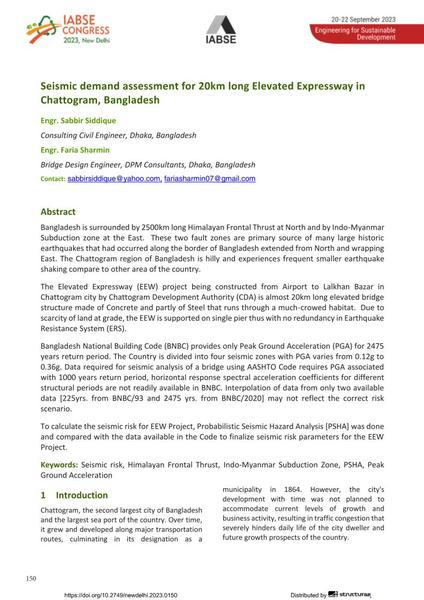Seismic demand assessment for 20km long Elevated Expressway in Chattogram, Bangladesh

|
|
|||||||||||
Bibliografische Angaben
| Autor(en): |
Sabbir Siddique
(Consulting Civil Engineer, Dhaka, Bangladesh)
Faria Sharmin (Bridge Design Engineer, DPM Consultants, Dhaka, Bangladesh) |
||||
|---|---|---|---|---|---|
| Medium: | Tagungsbeitrag | ||||
| Sprache(n): | Englisch | ||||
| Tagung: | IABSE Congress: Engineering for Sustainable Development, New Delhi, India, 20-22 September 2023 | ||||
| Veröffentlicht in: | IABSE Congress New Delhi 2023 | ||||
|
|||||
| Seite(n): | 150-155 | ||||
| Anzahl der Seiten (im PDF): | 6 | ||||
| DOI: | 10.2749/newdelhi.2023.0150 | ||||
| Abstrakt: |
Bangladesh is surrounded by 2500km long Himalayan Frontal Thrust at North and by Indo-Myanmar Subduction zone at the East. These two fault zones are primary source of many large historic earthquakes that had occurred along the border of Bangladesh extended from North and wrapping East. The Chattogram region of Bangladesh is hilly and experiences frequent smaller earthquake shaking compare to other area of the country. The Elevated Expressway (EEW) project being constructed from Airport to Lalkhan Bazar in Chattogram city by Chattogram Development Authority (CDA) is almost 20km long elevated bridge structure made of Concrete and partly of Steel that runs through a much-crowed habitat. Due to scarcity of land at grade, the EEW is supported on single pier thus with no redundancy in Earthquake Resistance System (ERS). Bangladesh National Building Code (BNBC) provides only Peak Ground Acceleration (PGA) for 2475 years return period. The Country is divided into four seismic zones with PGA varies from 0.12g to 0.36g. Data required for seismic analysis of a bridge using AASHTO Code requires PGA associated with 1000 years return period, horizontal response spectral acceleration coefficients for different structural periods are not readily available in BNBC. Interpolation of data from only two available data [225yrs. from BNBC/93 and 2475 yrs. from BNBC/2020] may not reflect the correct risk scenario. To calculate the seismic risk for EEW Project, Probabilistic Seismic Hazard Analysis [PSHA] was done and compared with the data available in the Code to finalize seismic risk parameters for the EEW Project. |
||||
